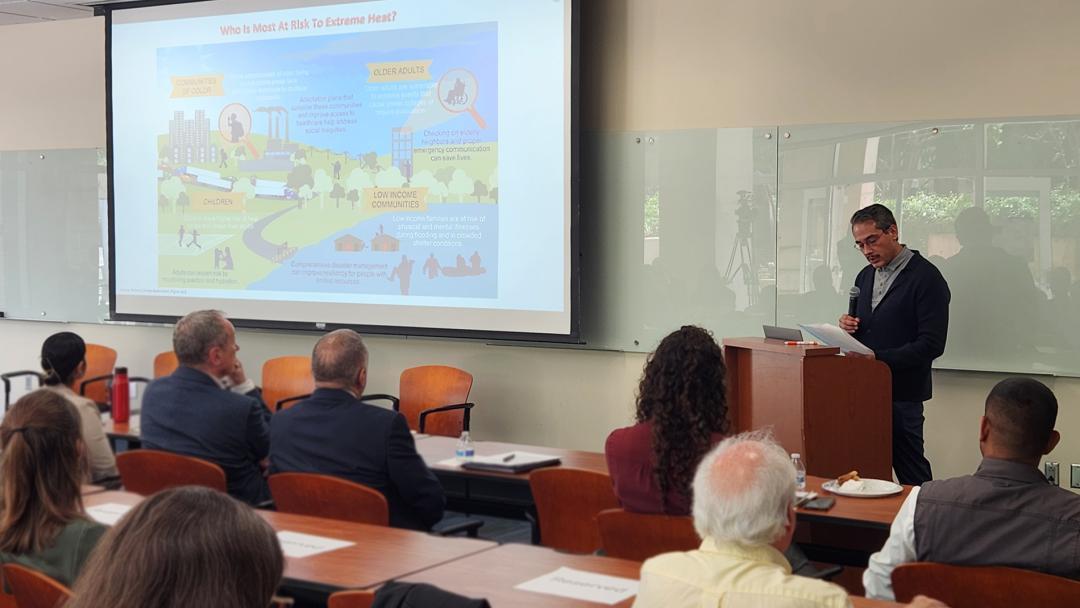
Michael Méndez talks about wildfire threats to migrant farmworkers during a CUSP symposium. Photo by Han Parker
CUSP presents “Igniting Solutions: What OC Can Learn from the LA Wildfires”
Challenges exposed during January’s wildfires in Los Angeles County and ways to meet those challenges during future Southern California disasters were hashed out at a nearly five-hour UC Irvine seminar on May 9.
The School of Social Ecology and Climate & Urban Sustainability Program (CUSP) presented “Igniting Solutions: What OC Can Learn from the LA Wildfires” with opening remarks by Rep. Dave Min (D-Irvine), three panels of experts from the university and the community, and a closing keynote address by Francisco Sánchez Jr., former associate administrator of the U.S. Small Business Administration (SBA) Office of Disaster Recovery & Resilience (ODR&R).
Richard Matthew, CUSP director and professor of urban planning & public policy, welcomed the crowd with introductory remarks about how “everybody is living in conditions of uncertainty” because of the rebuilding process, the possibility of future conflagrations and changes at the federal government level. He then introduced “somebody who's right at the center of all this, who is both familiar with the university and Orange County and with what's going on in Sacramento and inside the Beltway in D.C. So, let me introduce to you our representative … Dave Min.”
The congressman talked about his UC Irvine background (he’s a former law school professor, his wife is clinical law Professor Jane Stoever, and they reside in University Hills with their children), the uncertain times Matthew mentioned, climate change remaining a paramount issue, how wildfires and the risk of them are happening everywhere and how the current White House is complicating efforts to deal with disasters.
Panel 1: “Physical Systems” was introduced by its moderator, Associate Professor of urban planning & public policy Nícola Ulibarrí, who has worked on flooding studies with two of the panelists: Ralph J. and Carol M. Cicerone Professor of Earth system science James Randerson and Chancellor’s Professor of civil and environmental engineering and urban planning & public policy adjunct faculty member Brett Sanders. Manager of the Irvine Ranch Conservancy fire prevention and management program Madison Killebrew rounded out the panel.
Randerson talked about the scientific basis for reducing fires whipped up by Santa Ana winds, Killebrew discussed the Orange County Fire Watch volunteer program, and Sanders outlined his research into the “post-wildfire space” – flooding. The panel then took questions from the audience. Watch Matthew, Min and the complete “Physical Systems” panel presentation here:
Panel 2: “Social Systems” was introduced by moderator and Assistant Professor of urban planning & public policy Mukul Kumar. The panel included Associate Professor of urban planning & public policy Michael Méndez, Professor of urban planning & public policy Doug Houston; and Associate Professor of health, society and behavior Suellen Hopfer.
Qualifying that his research has been more confined to areas north of Los Angeles County such as Santa Barbara and Sonoma County, Méndez talked about wildfire threats to migrant farmworkers specifically and vulnerable, unrepresented communities in general. Based on her research in the Coachella Valley, Hopfer focused on ways to improve crisis communication and messaging in Orange County. Houston drilled down on the interaction between wildfires and the floods and mudslides that follow. The panel then entertained audience questions. View the full “Social Systems” panel here:
Panel 3: “Policy and Planning” was moderated by Professor Emeritus of urban planning & public policy and Water UCI Director David Feldman, whose panelists were Ulibarrí, UC Irvine campus reserves Manager Julie Coffey and Orange County Fire Authority Division 2 Chief Nick Freeman.
Coffey talked about how the university’s land management practices reduce wildfire threats – and how they could be applied throughout Southern California fire zones. Sadly, according to Freeman, wildfires are happening more often, burning more quickly and are more destructive, taxing government resources. He called for smarter construction when building and rebuilding not only in fire zones but anywhere in California given recent events. Ulibarrí zeroed in on the key policy failures that occurred during the LA wildfires – and what we should learn from them going forward. See the entire “Policy and Planning” panel here:
Introducing Sánchez, Department of Urban Planning & Public Policy Chairman and Professor Walter Nicholls said the former SBA administrator “was at the forefront of local disaster responses as well as disaster responses at the federal level,” and that “he has intimate knowledge from working with all those levels of government, bringing people together and responding to what needs to be done when the threat is something like a hurricane or one of these wildfires.”
In his address, Sánchez mentioned that a large percentage of the government aide and loans his former agency distributed went to homeowners and property owners, and not just small businesses. Learn from Sánchez how the SBA has come to the rescue after past disasters and what must be done in the future to continue that vital work here:
At the conclusion of “Igniting Solutions,” Matthew revealed that a written call to action based on the full day of discussions will be distributed soon.
— Matt Coker